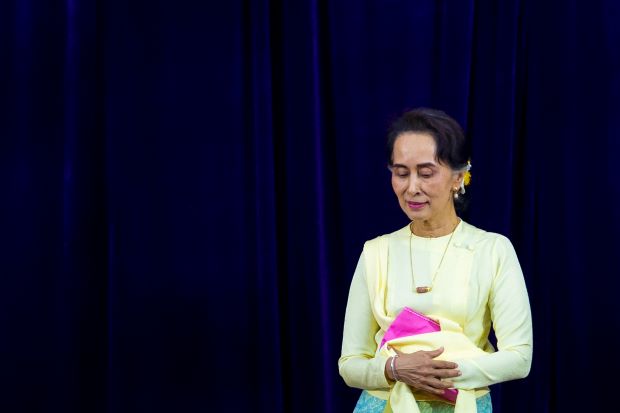Aung San Suu Kyi moved to unknown location from prison by Myanmar junta
By Sui Lee Wee
YANGON – Myanmar’s ousted civilian leader, Aung San Suu Kyi, has been moved by the military junta to an unknown location from a prison in the capital, Naypyitaw, raising questions about her safety.
Suu Kyi and Win Myint, the country’s former president, were relocated “to a safe place because of the high temperatures in the prison,” Zaw Min Tun, the military spokesperson, said Wednesday (17), without disclosing their location. Temperatures in Naypyitaw hit 114.8 degrees Fahrenheit, or 46 degrees Celsius, in the past week.
Few people in Myanmar believe that the military is genuinely concerned about Suu Kyi’s welfare.
The unexpected movement of Suu Kyi, 78, comes as the military is under intense pressure from a rebel alliance. In recent months, it has suffered its worst losses since seizing power in a coup in 2021.
Suu Kyi, who was deposed in the coup and is still widely revered in the country, is serving a 27-year sentence on corruption and other charges. Rights groups and supporters say the charges were trumped up and meant to keep the Nobel Peace laureate from elected office. Kim Aris, Suu Kyi’s younger son, said he believes the junta could use his mother as a potential “bargaining chip”.
“As the fighting is getting closer and closer” to the capital, he said, “they are getting more desperate and trying to put things in place that might protect them a little bit.”
Aris, speaking by telephone from his home in London, said he received a brief letter from his mother at the beginning of the year, the first time he had heard from her since the coup. Suu Kyi told him that it was cold in prison at that time and she had problems with her teeth.
In a separate telephone interview, a lawyer for Suu Kyi, who spoke on condition of anonymity because of a gag order prohibiting him from talking publicly about the case, said he was puzzled about the latest move, adding that he believed the military was exploiting his client for its own purposes.
Some of her supporters fear that the military government could use her as a pawn to mollify opposition forces, or even as a human shield.
She was “escorted away in heavily secured vehicles” late Tuesday (16), according to Kyaw Htwe, a spokesperson for Suu Kyi’s political party, the National League of Democracy. She left all her belongings behind, and her whereabouts were unknown.
“It’s challenging to speculate on her situation, as it remains uncertain whether her relocation is temporary or permanent,” Kyaw Htwe said.
The military, which has in some way or form ruled Myanmar for nearly a half-century, has long been threatened by Suu Kyi’s enduring popularity. For 15 years, it held her under house arrest, briefly freeing her at some points and then detaining her again. It released her in 2010, as it was moving toward a power-sharing arrangement, and she returned to politics, her party winning landslide elections.
In 2020, Suu Kyi repeated that feat, winning by an even bigger margin. On Feb. 1, 2021, just hours before she and her fellow lawmakers were to take their seats in Parliament, the military arrested Suu Kyi, Win Myint and senior members of her party, accusing them of committing voter fraud.
In the years since, the country’s pro-democracy movement has moved on beyond Suu Kyi. But she remains a household name, and analysts have speculated that she could be used as a prop to show that the military is ready to open talks with her.
Since the coup, Myanmar has devolved into a state of civil war. For more than two years, the military battled thousands of armed resistance fighters, with the rebels holding ground in the countryside and the government in the big cities.
But, in recent months, opposition forces have scored significant victories against the military, raising hopes that the end could be near for the junta. Starting in October 2023, an alliance of rebel forces took several key towns from the military in northern Shan State. In western Myanmar, the Arakan Army, an ethnic armed organization, said it had captured several battalions and army bases.
This month, rebel forces said they launched a drone strike on military targets in Naypyitaw. Last week, rebels belonging to the Karen ethnic group captured Myawaddy, a key trade town on the Thai border.
“My hunch is that Min Aung Hlaing is backing down a bit,” said Khin Zaw Win, director of the Tampadipa Institute, a policy advocacy organization based in Yangon, referring to the commander in chief of the armed forces who orchestrated the coup.
“Militarily, he can’t turn it around,” Khin Zaw Win said. “He has this ace card, whose name is Aung San Suu Kyi, and he wants to make sure that this card remains in his pocket.”
-New York Times



Comments are closed, but trackbacks and pingbacks are open.